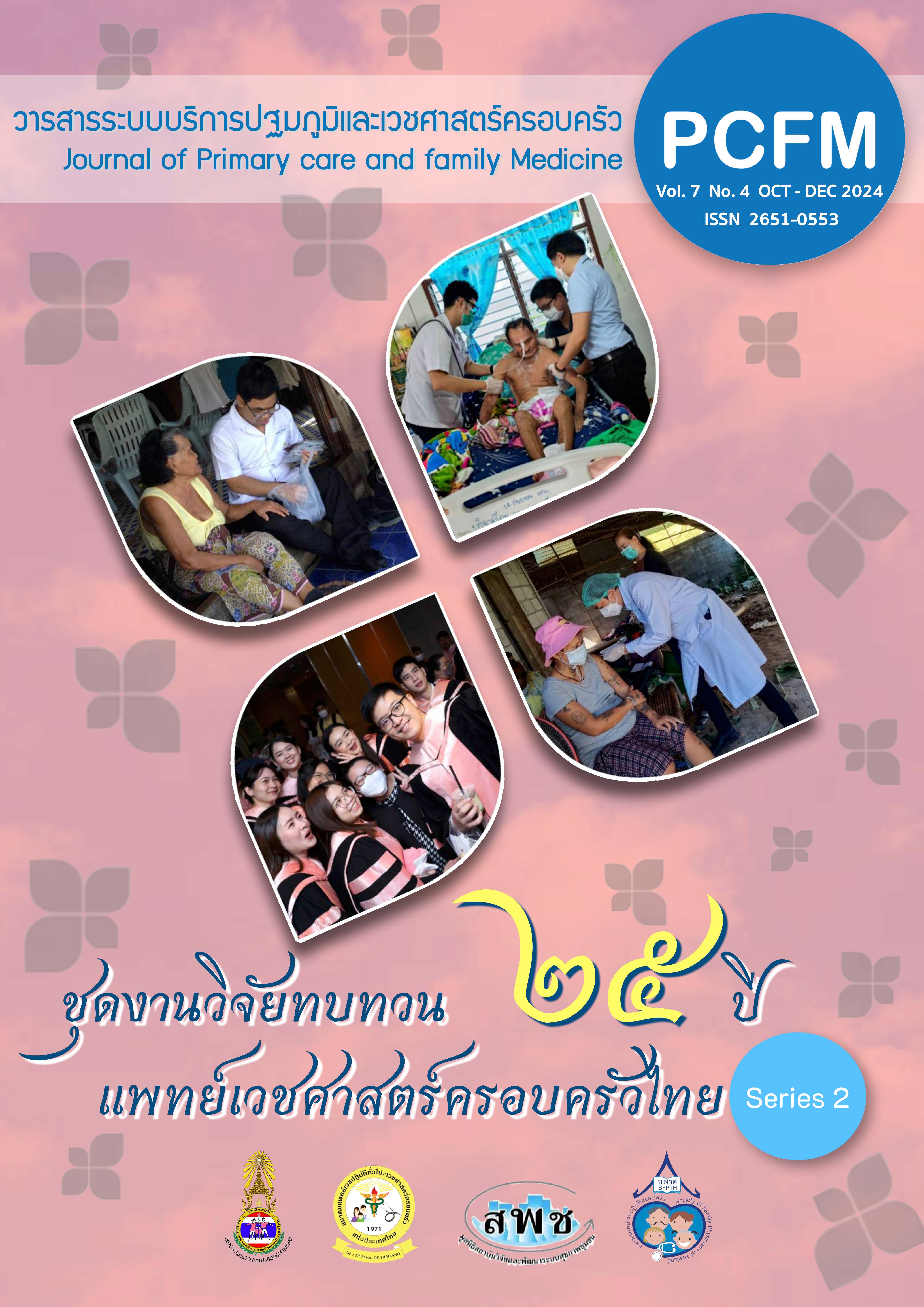ความชุกและปัจจัยที่สัมพันธ์กับภาวะความรู้สึกเป็นภาระในผู้ดูแลเด็กสมาธิสั้นในโรงพยาบาลสงขลา
Main Article Content
บทคัดย่อ
ที่มา: หาความชุกและปัจจัยที่สัมพันธ์กับภาวะความรู้สึกเป็นภาระในผู้ดูแลหลักของผู้ป่วยเด็กโรคสมาธิสั้นที่เข้ารับการรักษาในคลินิกจิตเวชโรงพยาบาลสงขลา
วัสดุและวิธีการ: เป็นการศึกษาวิจัยเชิงพรรณนาภาคตัดขวาง ทำการศึกษาในกลุ่มผู้ดูแลผู้ป่วยเด็กสมาธิสั้นจำนวน 114 ราย บันทึกข้อมูลผ่านแบบสอบถามข้อมูลทั่วไปของผู้ดูแล ข้อมูลทั่วไปของผู้ป่วยโรคสมาธิสั้น และเครื่องชี้วัดภาระในการดูแลของผู้ดูแลผู้ป่วยเรื้อรังฉบับภาษาไทย วิเคราะห์ข้อมูลด้วยสถิติถดถอยโลจิสต์ติคหาปัจจัยที่สัมพันธ์กับภาวะความรู้สึกเป็นภาระ
ผลการศึกษา: พบภาวะความรู้สึกเป็นภาระในผู้ดูแลหลักของผู้ป่วยเด็กสมาธิสั้นร้อยละ 32.5 ปัจจัยที่สัมพันธ์ที่กับความรู้สึกเป็นภาระในการดูแลผู้ป่วยเด็กสมาธิสั้นอย่างมีนัยสำคัญทางสถิติ คือ ชนิดของโรคสมาธิสั้นตามอาการเด่นที่ผู้ป่วยมี ส่วนผู้ดูแลที่มีการศึกษาอยู่ในระดับสูง และการไม่มีเด็กคนอื่นที่ต้องการการดูแลเป็นพิเศษในครอบครัว (เช่น พิการ ปัญญาอ่อน เด็กพิเศษ เจ็บป่วยเรื้อรัง) สามารถลดความรู้สึกเป็นภาระของผู้ดูแล
สรุป: ความชุกของภาวะความรู้สึกเป็นภาระของผู้ดูแลหลักของผู้ป่วยเด็กสมาธิสั้นเท่ากับร้อยละ 32.5 และสัมพันธ์กับชนิดของโรคสมาธิสั้นตามอาการเด่นที่ผู้ป่วยมีโดยเฉพาะชนิดซนอยู่ไม่นิ่ง หุนหันพลันแล่น และชนิดผสม
คำสำคัญ: ความชุก ปัจจัย ภาวะความรู้สึกเป็นภาระของผู้ดูแล โรคสมาธิสั้น
Article Details

อนุญาตภายใต้เงื่อนไข Creative Commons Attribution-NonCommercial-NoDerivatives 4.0 International License.
เนื้อหาและข้อมูลในบทความที่ลงตีพิมพ์ในวารสาร PCFM ถือเป็นข้อคิดเห็นและความรับผิดชอบของผู้เขียนบทความโดยตรง ซึ่งกองบรรณาธิการวารสารไม่จำเป็นต้องเห็นด้วยหรือร่วมรับผิดชอบใด ๆ
บทความ ข้อมูล เนื้อหา รูปภาพ ฯลฯ ที่ได้รับการตีพิมพ์ลงในวารสาร PCFM ถือเป็นลิขสิทธิ์ของวารสาร PCFM หากบุคคลหรือหน่วยงานใดต้องการนำทั้งหมดหรือส่วนหนึ่งส่วนใดไปเผยแพร่ต่อหรือเพื่อกระทำการใด ๆ จะต้องได้รับอนุญาตเป็นลายลักษณ์อักษรจากวารสาร PCFM ก่อนเท่านั้น
เอกสารอ้างอิง
DSM-IV P. Diagnostic and statistical manual of mental disorders: DSM-IV-TR. Washington, DC.: American Psychiatric Association, 2000.
Polanczyk G, De Lima MS, Horta BL, Biederman J, Rohde LA. The worldwide prevalence of ADHD: a systematic review and metaregression analysis. Am J Psychiatry. 2007;164:942-8.
Danielson ML, Bitsko RH, Ghandour RM, Holbrook JR, Kogan MD, Blumberg SJ. Prevalence of parent-reported ADHD diagnosis and associated treatment among US children and adolescents, 2016. J Clin Child Adolesc Psychol. 2018;47:199-212.
Visser SN, Danielson ML, Bitsko RH, Holbrook JR, Kogan MD, Ghandour RM, et al. Trends in the parent-report of health care provider-diagnosed and medicated attention-deficit/hyperactivity disorder: United States, 2003–2011. J Am Acad Child Adolesc Psychiatry. 2014;53:34-46. e2.
Visanuyothin T, Pavasuthipaisit C, Wachiradilok P, Arunruang P, Buranasuksakul T. The prevalence of attention deficit/hyperactivity disorder in Thailand. Journal of Mental Health of Thailand. 2013;21:66-75.
Pattarakitnirun W. The prevalence of ADHD in primaryschool children in Hat Yai, Songkla. [dissertation]. Songkla: Prince of Songkla University; 2007
Klongdee K, Nintachan P, Sangon S. Factors related to parenting stress in caregivers of children with attention-deficit/hyperactivity disorder. The Journal of Psychiatric Nursing and Mental Health. 2016;30:52-68.
Siripongpan A, Putthisri S. Factors affecting mental health of mothers of patients with attention-deficit hyperactive disorder (ADHD). Journal of the Psychiatric Association of Thailand. 2016;61:205-16.
Al-Balushi N, Al-Alawi M, Al Shekaili M, Al-Balushi M, Mirza H, Al-Huseini S, et al. Predictors of burden of care among caregivers of drug-naive children and adolescents with ADHD: A cross-sectional correlative study from Muscat, Oman. J Atten Disord. 2019;23:517-26.
ชนัญชิดา ดุษฎีทูลศิริ, รัชนี สรรเสริญ, วรรณรัตน์ ลาวัง. การพัฒนาแบบวัดภาระในการดูแลของผู้ดูแลผู้ป่วยเรื้อรัง. วารสารพยาบาลและการศึกษา. 2554;4:62-75.
ภาระวี ชโลธร. ความชุกและปัจจัยที่เกี่ยวข้องกับภาวะซึมเศร้าในผู้ปกครองของผู้ป่วยสมาธิสั้น ที่มารักษาในโรงพยาบาลเจ้าพระยายมราช. วารสารแพทย์ เขต 4-5. 2564; 40:429-38.
Fridman M, Banaschewski T, Sikirica V, Quintero J, Erder MH, Chen KS. Factors associated with caregiver burden among pharmacotherapy-treated children/adolescents with ADHD in the Caregiver Perspective on Pediatric ADHD survey in Europe. Neuropsychiatr Dis Treat. 2017;13:373-86.
Mostafavi M, Areshtanab HN, Ebrahimi H, Vahidi M, Amiri S, Norouzi S. Caregiver burden and related factors in Iranian mothers of children with attention-deficit hyperactivity disorder. Nursing and Midwifery Studies. 2020;9:149-56.


